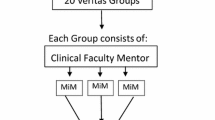Abstract
Objective
The purpose of this article is to document and evaluate the initiation of a mentoring model for junior faculty utilizing a peer group approach rather than the traditional dyadic model.
Methods
Junior faculty members in an academic department of psychiatry at Sunnybrook Hospital, University of Toronto, were invited to take part in a peer mentoring program involving evening meetings every 2 months over a 1-year period from 2004–2005. Of the 12 invitees, 10 agreed to participate in the program. The group participants developed the program agenda collectively. Learning objectives as well as a list of topics of interest were established at the inaugural meeting. A focus group was held at the end of 12 months to provide a descriptive, qualitative evaluation. The focus group leader prepared a report based on observations and notes taken during the focus group.
Results
The report prepared by the focus group leader identified six main themes that included: program development, knowledge gains, interpersonal gains, psychological/emotional gains, process of the program and future directions. The overall response was clearly favorable with a unanimous decision to maintain the group and continue meeting into the next year.
Conclusion
A peer group mentoring format for junior faculty in an academic department of psychiatry can be an effective model of mentoring.
Similar content being viewed by others
References
Dunnington GL: The art of mentoring. Am J Surg 1996; 171: 604–607
Anderson PC. Mentoring. Acad Med 1990; 70: 4–5
Rodenhauser P, Rudisill JR, Dvorak R: Skills for mentors and protégés applicable to psychiatry. Acad Med 2000; 24: 1,14-27
Palepu A, Friedman RH, Barnett RC, et al. Junior faculty members’ mentoring relationships and their professional development in U.S. medical schools. Acad Med 1998; 736: 318–323
Steiner JF, Curtis P, Lamphear BP, et al: Assessing the role of influential mentors in the research development of primary care fellows. Acad Med 2004; 79: 865–872
Wingard DL, Garman KA, Reznik V: Facilitating faculty success: outcomes and cost benefit of the UCSD National Center of Leadership in Academic Medicine. Acad Med 2004; 79(10 suppl): S9–S11
Levinson W, Kaufman K, Clark B, et al: Mentors and role models for women in academic medicine. West J Med 1991; 154: 423–426
Tesch BJ, Wood HM, Helwig AL, et al: Promotion of women physicians in academic medicine: glass ceiling or sticky floor? JAMA 1995; 273: 1022–1025
Sambunjak D, Straus SE, Marusic A: Mentoring in academic medicine: a systematic review. JAMA 2006; 296: 1103–1115
Pololi L, Knight S, Dennis K, et al: Helping medical school faculty realize their dreams: an innovative, collaborative mentoring program. Acad Med 2002; 77: 377–84
Swenson JR, Boyle A, Last J, et al: Mentorship in medical education. Annals RCPSC: 1995; 28: 165–169
Kram K, Isabella L: Mentoring alternatives: the role of peer relationships in career development. Acad Manage J 1985; 28: 110–132
Edwards K: “Short stops”: peer support of scholarly activity. Acad Med 2002; 77: 939
Whitley R, Crawford M: Qualitative research in psychiatry. Can J Psychiatry 2005; 50: 108–114
Berk RA, Berg J, Mortimer R, et al: Measuring the effectiveness of faculty mentoring relationships. Acad Med 2005; 80: 66:71
Yalom ID, Leszcz M: The Theory and Practice of Group Psychotherapy, 5th ed. New York, Basic Books, 2005
Whitman N: A review of constructivism: understanding and using a relatively new theory. Fam Med 1994; 25: 517–521
Schon DA: Educating the reflective practitioner: toward a new design for teaching and learning in the professions. San Francisco, Calif., Jossey-Bass, 1987
Author information
Authors and Affiliations
Corresponding author
Rights and permissions
About this article
Cite this article
Moss, J., Teshima, J. & Leszcz, M. Peer Group Mentoring of Junior Faculty. Acad Psychiatry 32, 230–235 (2008). https://doi.org/10.1176/appi.ap.32.3.230
Received:
Revised:
Accepted:
Published:
Issue Date:
DOI: https://doi.org/10.1176/appi.ap.32.3.230




